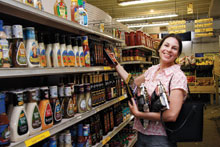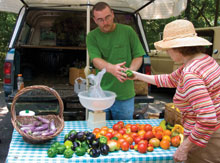According to the magazine Smart Shopper, the cost of eggs rose about 30 percent in the past year. Dog food and juice inched up 15 percent. With the rising cost of fuel tacked onto to grocery bills, shoppers are finding their budgets stretched thinner and thinner—all the more reason to seek out cost-cutting tips and tricks.

A Good Morning America segment in March focused on how to save on organics, advising consumers to “focus your organic spending on fresh foods like meat, milk and produce.” For some consumers, cutting costs and upgrading to pesticide-free products seems counterintuitive, but arguably, better-quality food means better health and less money spent at the doctor’s office. For other shoppers, organics are a priority no matter what the sticker price.
“Some of the most well-known organic brands, such as Earthbound Farms, Health Valley, Stonyfield Farm and Annie’s Homegrown offer coupons right on their Web sites, often for substantial savings,” according to Good Morning America. “You can also save by going generic, because many grocers now offer their own store brand organics.” Ingles’ Harvest Farms organic brand can be found throughout the store.
Other culled-from-national-media tips include buying just what you need and use: wasted food is wasted money. To help resist the urge to splurge, pay with cash. Making a list in advance and shopping weekly rather than every couple days curbs excess spending, as does brown-bagging lunch. Cook dinners that can make a second showing in the lunch box—most of us have access to a microwave at work, so soups, stews, pastas and casseroles make for good leftovers.
Want more ways to save? Here are a few ideas to cut grocery costs in local stores.
The farmer in the deal
Farmers’ and tailgate markets abound in the area, offering locally grown, in-season produce (often organic). The markets cut out the middleman (not to mention stockers and baggers), passing substantial savings for fresh-from-the field foods onto you. Unfortunately, the season, sun and rain dictate the variety of produce you’ll find, but peak growing times turn up a wealth of options, along with prepared items such as pastries, honey, jam and dairy.
For market hours, locations and directions, visit www.asapconnections.org.
The Western North Carolina Farmers’ Market (570 Brevard Road, Asheville) is a completely different animal than its weekly, tailgate counterparts. Owned by the state of North Carolina and operated by the N.C Department of Agriculture and Consumer Services, the WNC Farmers’ Market is a year-round, seven-days-a-week operation housed in a permanent structure. Seasonal produce is often eclipsed by canned goods, honey, deli items, ice cream and gifts. Still, the foodstuffs in most cases come direct from the producers, and low-overhead means lower costs to consumers.
For shoppers looking to buy discounted fruits and veggies on a daily basis, produce stands are a good bet. The Newbridge Fruit Market (83 Weaverville Road, Asheville) is one of many locations open year-round, specializing in produce (mostly nonorganic, though often local), both seasonal and trucked in from other parts of the country. A few staples, such as milk, eggs and butter, can also be purchased in the open-air market.

What’s in store
If driving around to farm markets is too much of a drain on the gas tank, sometimes the best financial decision is to limit shopping to as few stores as possible. That’s where bargain-basement food retailers come in. Amazing Savings (3018 Old U.S. Highway 70, Black Mountain, 669-8988 and 121 Sweeten Creek Road, Asheville, 277-0805) offers deep discounts on health foods, grocery items and organic produce. The savings are, in fact, pretty substantial, but occasionally items are damaged or past their sell-by dates. The store carries closeouts, so stock varies.
ALDI (480 Swannanoa River Road, Asheville; 1344 Patton Ave., Asheville; 110 Duncan Hill Road, Hendersonville) grocery stores are recent additions to the Asheville area and to the country as a whole (the chain entered the U.S. market in 1976). Headquartered in Germany, ALDI (short for Albrecht Discount) specializes in staples, rarely carries brand names and employs a wide range of cost-saving innovations from the 25-cent charge for a shopping cart and 5 to 10-cent charges for bags (customers are encouraged to bring their own bags, and checkout is a self-bagging endeavor).
And then, for store-loyal customers, there are coupons. Sure, those money-back offers seem so 1950s. They’re not glamorous, and clipping them from a Sunday circular (who gets those anymore, anyway?) is time-consuming. Plus, more often than not, coupons encourage shoppers to spend on items they wouldn’t normally buy. Unless spray cheese is a staple in your diet, you’re not “saving” anything by purchasing it with a 50-cent-off coupon. The trick is to first make a list of everything you need to buy for the week, then clip coupons only for items on that list. If toaster waffles aren’t on your list to begin with, don’t clip a 2-for-1 coupon for waffles.
If you do want to go the coupon route without the Sunday circular, try online coupon sites such as coupons.smartsource.com (no signup requirements), or pick up the coupon books published by your favorite store. EarthFare, Greenlife Grocery and the French Broad Food Co-op all put out monthly coupon booklets for items they sell.
Great clips
Coupons probably won’t count toward bulk items, but buying in quantity (the concept behind Sam’s Club) and without extraneous packaging (the idea of the coffee beans and trail-mix bins at Fresh Market) can cut expenses. There is the matter of the upfront cost: The pack of 36 toilet-paper rolls costs more than the four-pack, but each individual item carries a much lower price tag. Same thing when it comes to buying liquid soap, flour, nuts, hot cereal and any number of other bulk items.
Troy Cole opened his Mars Hill Bulk Food Store, (745 Carl Eller Road, Mars Hill, 689-3353) five years ago. He carries jellies, jams, breads, honey and “real churned butter” that he picks up weekly from Ohio. Offerings also include hormone-free cheese, meats, fish, and dry-goods like flour, beans and sugar. Cole explains that the price of flour has been rising weekly—recently jumping $25 for a 50-pound bag. But for a bargain-hunting shopper with a large pantry, buying whole-wheat flour, pinto beans and unrefined sugar in 50-pound bags brings a large per-pound savings. Cole takes large orders on any of his bulk items.
For those with less storage, staples can still be purchased in the bulk sections of the French Broad Food Co-op, Haywood Road Market, Greenlife, Earth Fare and Fresh Market. Because the beans, grains, cereals, dried fruits and nuts aren’t prepackaged, they cost less. Increase saving farther by learning to cook with these whole, unpackaged foods. Dried beans are significantly less expensive than their canned counterparts and can be reconstituted (with a little planning) in a Crock-Pot.
Member-owned food cooperatives, such as the French Broad, carry additional benefits. “Co-op owners receive 10 to 50 percent discounts on our top selling products through ‘Owner-Only Specials,’” reports the store’s Web site. “Owners can also receive a 20 percent discount on full-case special orders.”
Veggie tales
Another form of bulk buying comes in prepaid, seasonal produce from Community Supported Agriculture (CSA) programs. Organized through LocalHarvest (www.localharvest.org), consumers are matched with growers in their area, from whom they purchase “shares.” In the case of Burnsville, N.C.-based Firefly Farm, a share comprises 26 weeks of fresh seasonal vegetables—from asparagus to zucchini—with herbs and occasional flower bonuses. A half share, at $300 per year, feeds two or three people; and a full share ($550 per year) feeds four to six.
“Different farms organize their specific programs differently,” explains farm representative Elizabeth Gibbs. “Some make home deliveries for an extra charge. We bring produce to markets where we also sell retail.” Weekly pick-up points include the Greenlife Grocery tailgate market or Yancey County farmers market.
“There’s a below-retail discount built in,” she explains, “but you have to pay at least part of share cost up front.” For shoppers who can afford the initial investment, there’s still the time consideration. This is food straight from the ground: it’s no Stouffer’s heat-and-serve entree.
“Food that takes preparation costs less than food that’s already prepared,” Gibbs says. “I think one of the greatest things about CSA is that it forces people to eat more vegetables.”
For those interested in CSAs, almost all local farms have sold their shares for the 2008 season. Look into it in fall for the next season. Like clipping coupons, advance planning might be less-than-glamorous, but all the cash you recoup can go toward a pair of Jackie O-on-the-Riviera glasses. Wear those while standing in the checkout line and look the million bucks you’re saving.



“I bough rice at Amazing Savings that was so old that when I got it home it fermented into Sake’,
I call it great great great Uncle Bens.”
from comedian Greg Brown at the dwtheatre last week.